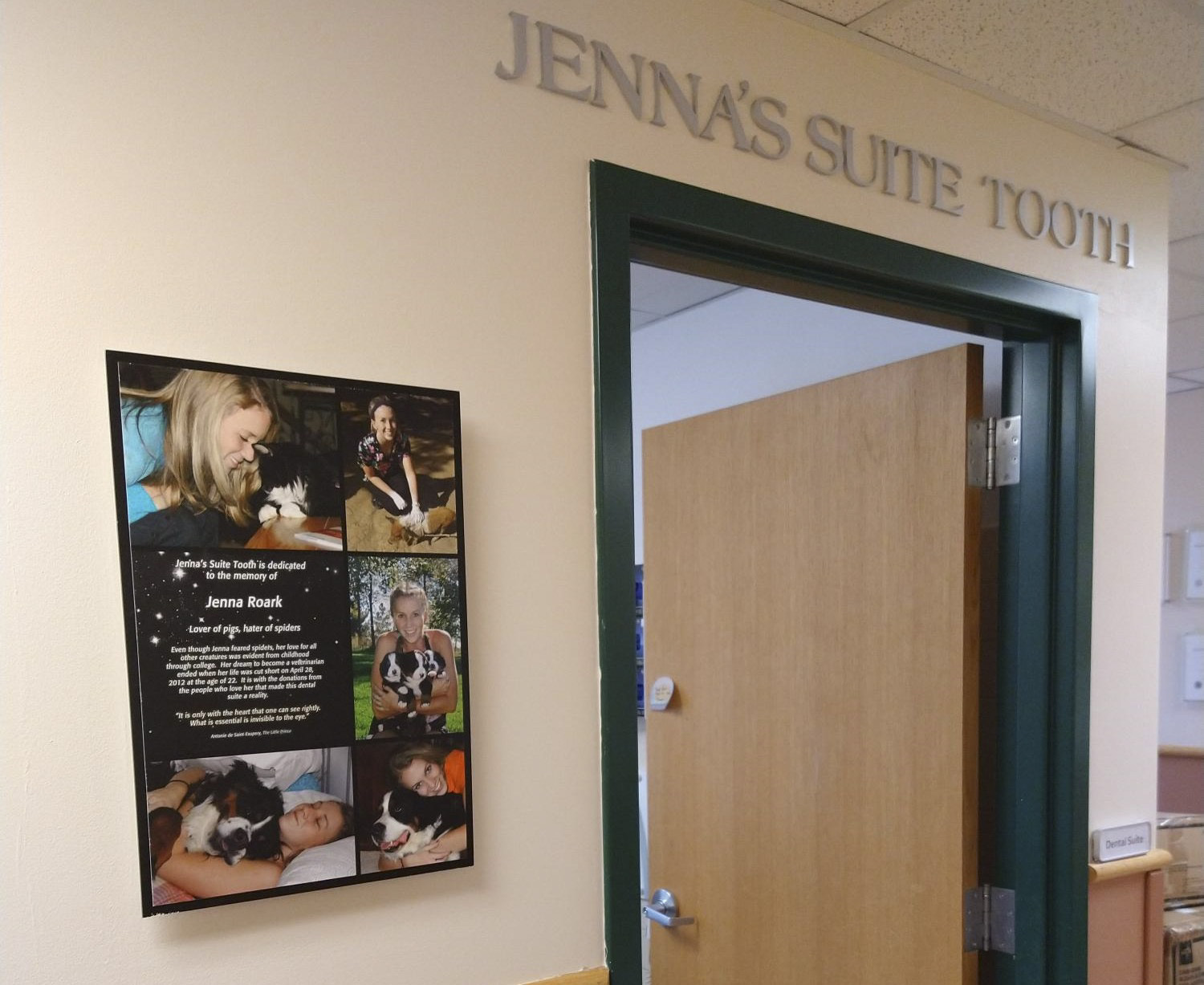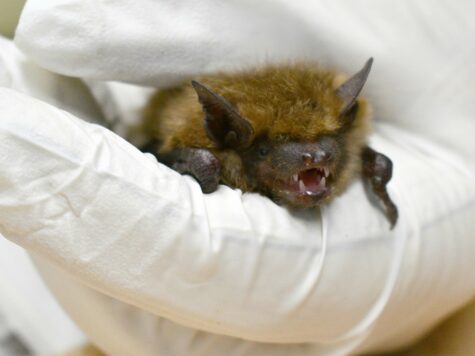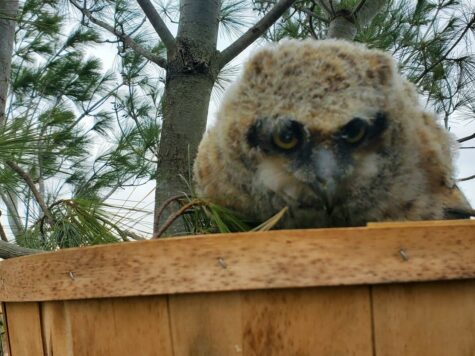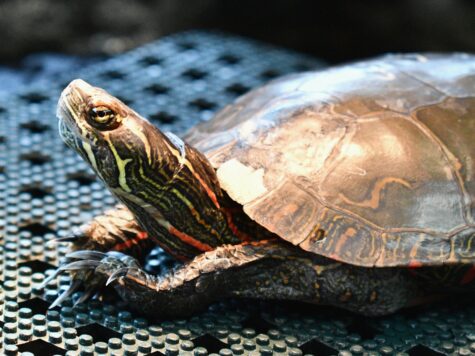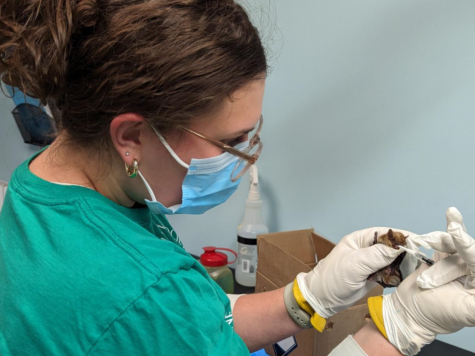Not all shelters are fortunate enough to have their own dental suite. Before 2012, Dane County Humane Society (DCHS) sent cats and dogs to local veterinary clinics to perform necessary dental procedures. Despite donated and discounted services from local veterinarians, staff spent considerable time coordinating and moving cats back and forth. There weren’t enough resources for animals to access the care they needed.
Thanks to an outpouring of memorial gifts to commemorate animal lover Jenna Roark, by the end of 2012, DCHS was able to establish a space dedicated to performing these procedures onsite. “Jenna’s Suite Tooth,” as it was lovingly named, was built in the former grooming room in the shelter’s Animal Medical Services Department.
In less than a year, a record number of 29 surgical procedures had been completed in the new dental suite. DCHS veterinarians have continued to outdo themselves, gaining efficiency and building better systems each year. A decade later, in 2022, our staff completed 226 dental procedures on 51 dogs and 175 cats.
“While your normal veterinarian will recommend routine dental cleanings for long-term dental health, in the shelter setting, we need to be efficient with our recourses and will generally reserve dental procedures for animals that have specific dental concerns,” DCHS veterinarians say, adding that each of these procedures include a cleaning. “We are trying to address any immediate issues for the animal, which often involves removing teeth that are causing pain or discomfort, so that an adopter can concentrate on getting them settled into their new home. From there, the adopter and their veterinarian can formulate a plan for the animal’s long-term dental care.”
Just as in humans, dental care is also important to our pets’ overall health. In honor of February being National Pet Dental Health Month, we look at why we should be thinking about our pets’ oral health and what we can do to help them maintain good dental hygiene.
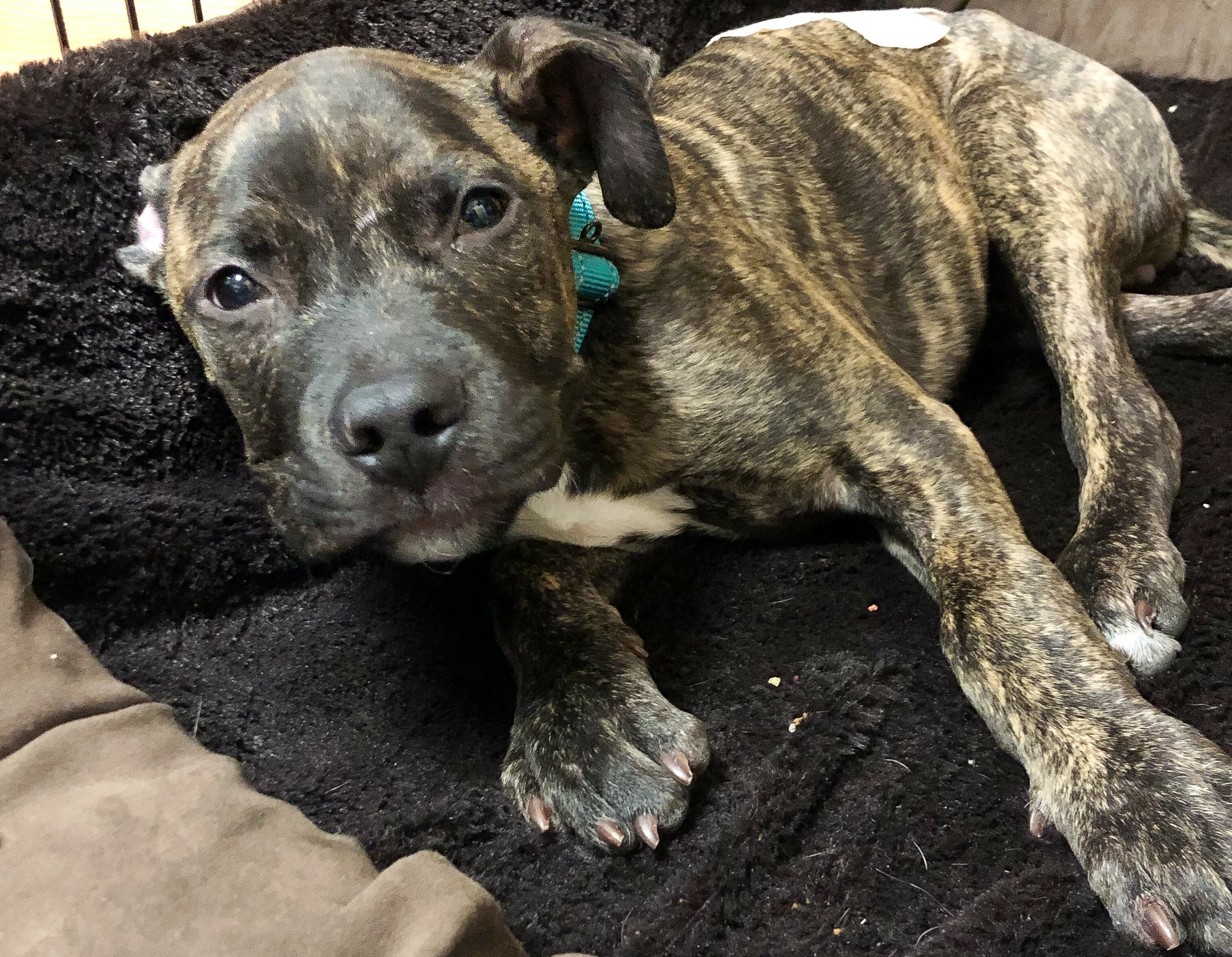
Conditions Stemming from Dental Issues
Dental care for pets is essential for preventing a variety of other medical concerns, the most common being periodontal, or gum, disease.
“Preventative care for gum disease can help avoid conditions that are painful or predispose the mouth to infection,” DCHS veterinarians say. “In severe cases, bacteria that has built up on the teeth can enter the bloodstream and affect other organs in the body.”
In general, dogs and cats are equally susceptible to periodontal disease. Small dog breeds tend to be more prone to advanced gum disease, and dogs and cats with flat-face characteristics (known as brachycephalic) and cats generally require more dental care.
“Cats are susceptible to a condition known as resorptive lesions. The cause of resportive lesions is unknown, but results in the hard outer surface of the tooth becoming eroded, exposing the sensitive inner portions of the tooth. The body responds by resorbing the tooth, but this process can take several months,” DCHS veterinarians explain. “There does not seem to be a certain type of cat that is more prone to this condition. Resorptive lesions are painful and require extraction to resolve discomfort.”
Advanced gum disease or severe resorptive lesions can lead to an animal needing many or all of their teeth extracted.
“We know that these conditions are chronically painful, even if the animal is not showing outward signs and are eating normally. Often removing the teeth is the best option to provide a pain-free mouth,” DCHS veterinarians say.
Cats also can suffer from stomatitis, a painful condition that causes chronic inflammation in the entire mouth. The teeth or bacteria present on the teeth are believed to trigger this abnormal response and removing all the teeth is often the only treatment that will resolve the issue.
Don’t fret if your pet’s dental condition requires many or all of their teeth to be extracted. “Most animals do very well with full mouth extractions,” DCHS veterinarians explain. “They usually can still eat both wet and dry foods even without any teeth.”
In addition, pet parents may see a change for the better in their pet’s behavior. Take Eddie the cat, for example. When he was surrendered to DCHS, his former family referred to him as the “mean” one. But during his initial exam upon admission, our Admitting Technicians discovered Eddie was suffering from severe dental disease throughout his mouth, as well as other painful medical issues. It wasn’t until after he healed from medical and dental treatments – including the extraction of several teeth – that Eddie could reveal his sweet and loving personality.
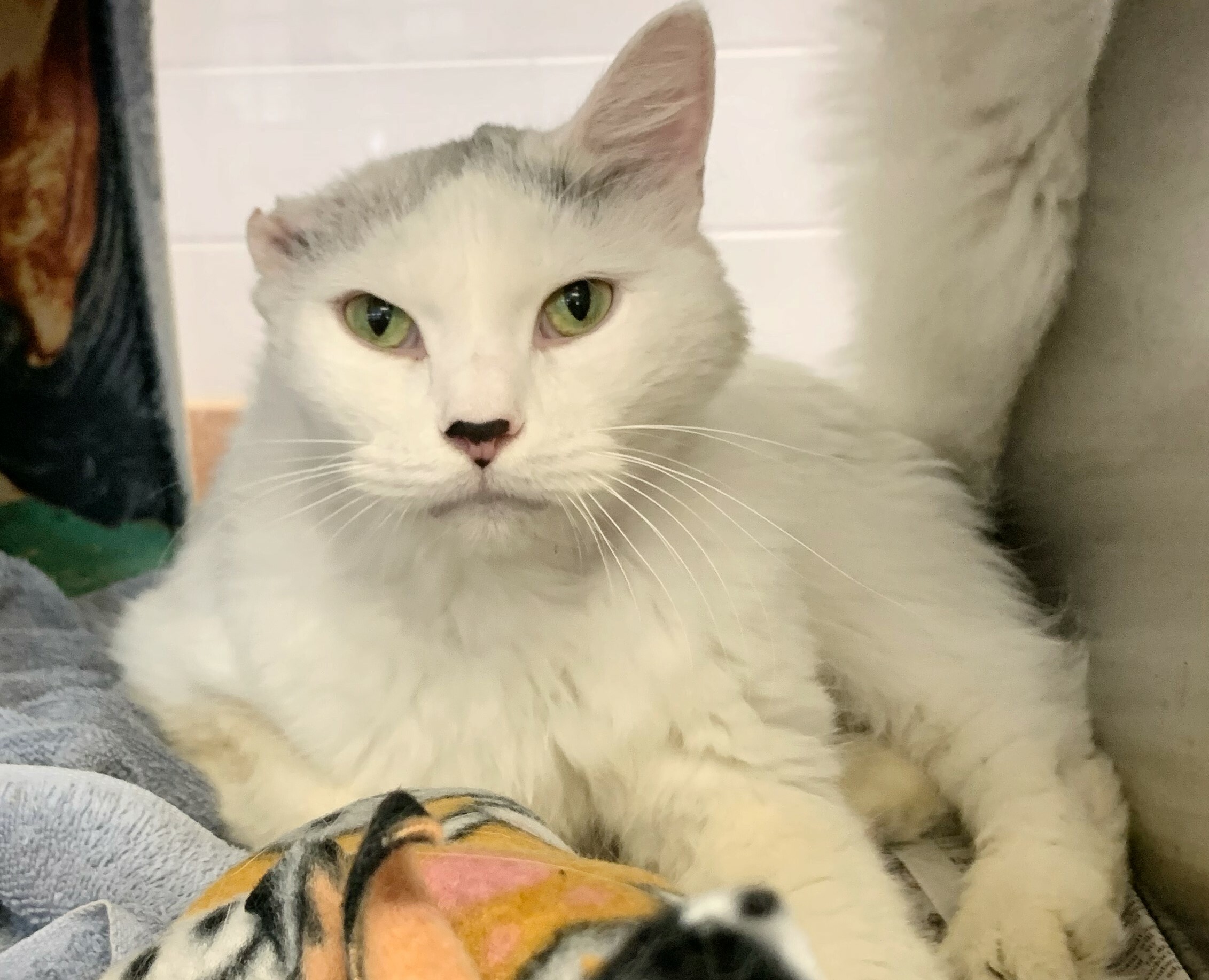
Regular Veterinary Exams are Key
Unfortunately, our pets cannot tell us when they’re experiencing oral pain. Most people believe animals will stop eating when they’re experiencing oral pain, but that is often not the case. “It is not uncommon to see both dogs and cats continue to eat well even with very advanced dental conditions,” DCHS veterinarians say.
What should dog and cat parents be on the lookout for? If a pet is experiencing oral issues, according to DCHS veterinarians, pet parents may notice an odor from the mouth beyond the normal “pet breath,” increased salivation, chattering or trembling of the teeth, frequent pawing at the face, swelling of the muzzle, redness of the gums, or abnormal appearance of the teeth.
But why wait for your pet to be in pain when you can take a proactive approach through regular veterinary checkups? Regular wellness exams with your veterinarian are so important because they can examine your pet’s mouth and check for concerns that may not otherwise be apparent to their owner.
Tips to Help Your Pet with Oral Care
Unfortunately, a large percentage of dental conditions are the result of genetic predispositions. “While we cannot eliminate this predisposition, regular oral care can help maintain oral health or minimize/slow the long-term effects,” DCHS veterinarians say.
“The extensiveness of dental care and procedures needed will vary significantly by the individual pet, so creating a dental care plan with your veterinarian is the best place to start,” they add.
While daily brushing is ideal, DCHS veterinarians suggest, “don’t let perfection be the enemy of good – brush their teeth as frequently as you’re able as some is better than none!”
There are several options for pet toothbrushes available on the market. “The best one to get is one that you’ll actually use, so factor in what you think would logistically work best for you and your pet,” DCHS veterinarians advise. “Using a pet toothpaste can help improve the taste as they come in various flavors; many include some enzymatic components and provide an abrasive surface to help remove plaque. Do not use human toothpaste in animals.”
Human toothpaste can contain ingredients that are toxic to cats and dogs.
“The most important aspect, however, is to make it an enjoyable experience [for your pet]. Taking it slow in the beginning and offering lots of praise and treats before, during, and after can help with sustaining the habit,” DCHS veterinarians say.
If you struggle with brushing your pet’s teeth, talk with your veterinarian about alternative products or consider products approved by the Veterinary Oral Health Council.
There are some conditions that are more preventable, like tooth fracture or wear. “Chewing hard surfaces can result in breaking the tooth crown, which, in addition to being painful, can predispose the tooth and mouth to infection,” DCHS veterinarians explain.
Some dogs like to hold abrasive materials like tennis balls in their mouths, which can cause abrasion to the teeth and wear the crowns down, exposing the softer and more sensitive portions of the tooth. Pet stores sell dog-safe tennis balls designed to prevent this problem.
Of course, accidents do happen, but DCHS veterinarians add, “Providing appropriate chewing toys and being aware of how your dog uses their mouth could help prevent some of these.”
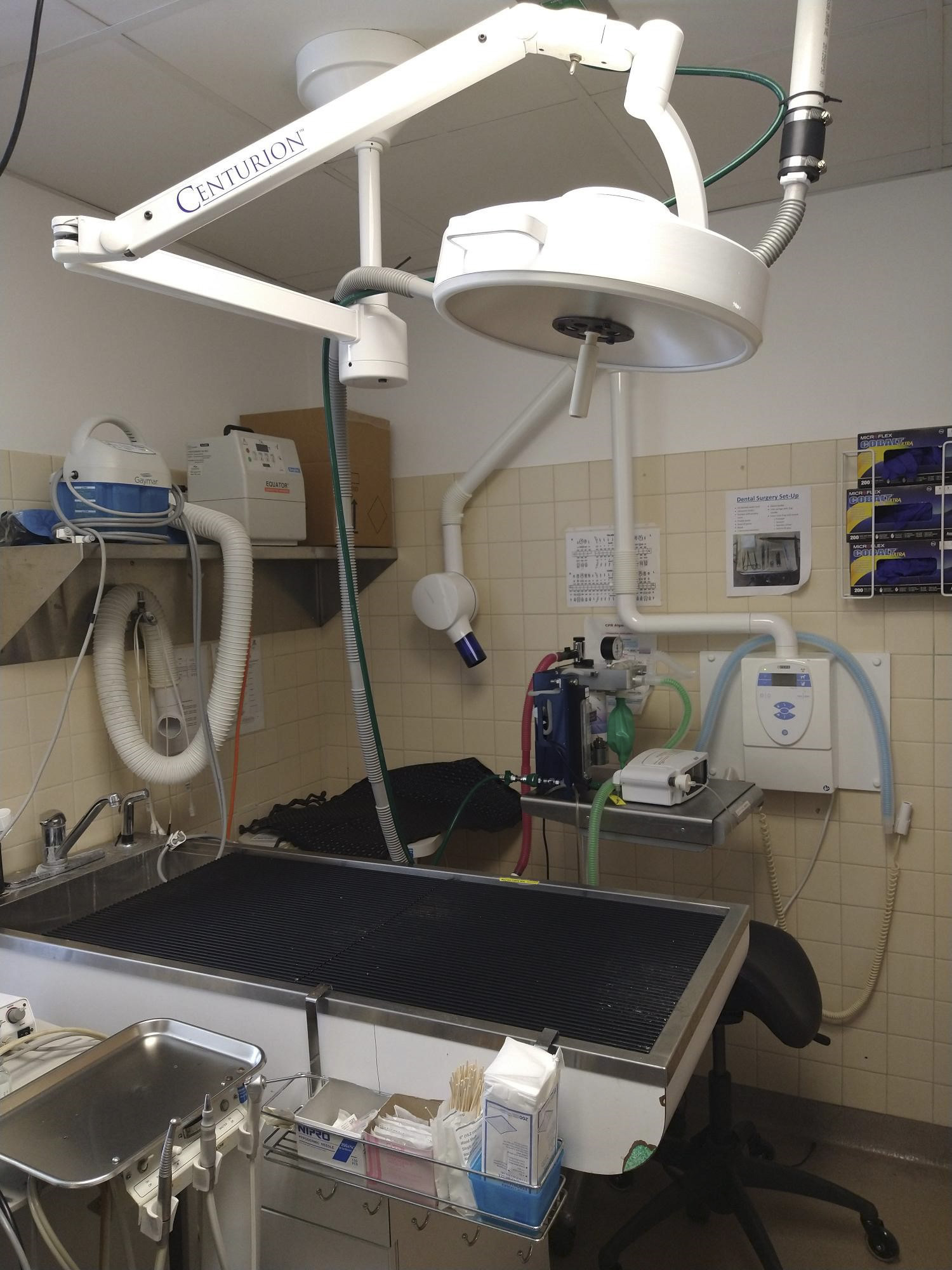
Plans to Expand DCHS’s Dental Suite
Thanks to the continued generosity of Jenna’s family, DCHS is currently working on plans to renovate Jenna’s Suite Tooth to include an additional dental bay so two veterinarians can perform dental procedures at the same time when necessary.
“The remodel will help us increase our dental teaching capacity to our intern veterinarians and provide them more hands-on experience during their time here,” DCHS veterinarians say.
In addition, this remodel will also allow DCHS to explore ways to help other shelters and rescue organizations access much-needed dental care.
Dental care is important to more than our pets’ medical health, but also their emotional health. It can make the difference for leading a pain-free life. If you haven’t made a plan yet with your veterinarian to help maintain your pet’s oral health, we encourage you to do so today.
Helping Ease Dental Discomfort
Dental Suite Helps Hundreds of Animals Heal
Thanks to the memorial gifts that allowed DCHS to create Jenna's Suite Tooth, our veterinarians have helped hundreds of dogs and cats with their oral discomfort. Among them was Farley, a pup who suffered facial and leg injuries after he was likely struck by a vehicle in January 2022. The tear in Farley's gums was so severe that the bone and tooth roots of his upper jaw were exposed when he opened his mouth. Thanks to the dental suite, one of our veterinarians performed emergency surgery to fix his mouth.
